By Kyle Orton (@KyleWOrton) on August 30, 2016

Polat Can, 2014, head of the YPG’s information centre (source)
Over the last twenty-four hours, as fighting has escalated between Turkey and the Kurdish People’s Protection Units (YPG), the armed wing of the Democratic Union Party (PYD), in northern Syria, an YPG/PYD operative has taken to Twitter to protest. Polat Can is the YPG’s representative to the American-led international coalition ranged against the Islamic State (IS), and his missives have sought to inform the coalition who and what terrorism is, which can be broadly summarized as: the Turkish government. Can himself, however, might easily be considered a terrorist since he is an allegedly-former member of the Kurdistan Workers’ Party (PKK), a registered terrorist organization by the United States, European Union, and Turkey.
Polat Can was the YPG’s spokesman before taking up his current post after the U.S. began using the PYD/YPG as its primary anti-IS instrument inside Syria after the Kobani battle.
Turkey’s relationship with the anti-IS coalition has been troubled, primarily because of the PYD’s involvement (more below), but in the early morning of 24 August the Turks intervened directly in northern Syria to help a consortium of mainstream rebels drive IS from Jarabulus.
The timing of Turkey’s intervention was determined by an IS suicide bombing in Gaziantep on 20 August, but the intervention intended to serve the dual purpose of degrading the IS threat and forestalling the PYD creating a contiguous statelet all along her border. There have since been clashes between Turkish and allied forces with the PYD, and Turkey has launched still-controversial airstrikes against PYD positions.
This was Can’s first tweet last night:
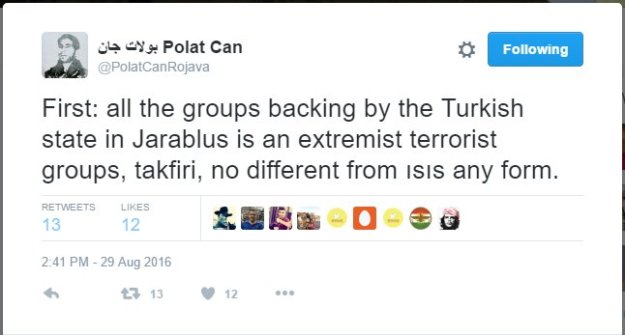
To say that the rebels Turkey backed in taking Jarabulus are “no different from ISIS” is ridiculous. Most of them are vetted by the U.S. and under the Free Syrian Army (FSA) brand.
This morning Can added:
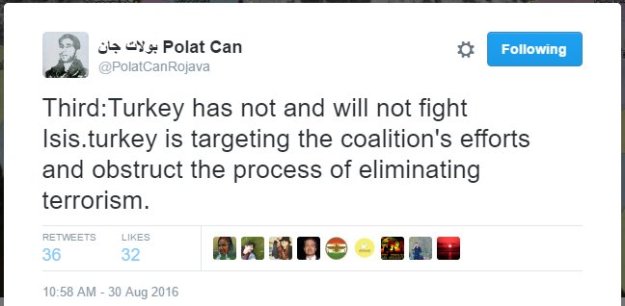
While Turkey has not supported IS, she has pursued policies that mean IS is stronger now than it otherwise would be. The reticence to be more aggressive against IS is largely a function of the government having other priorities, rather than any desire to see IS remain. There is little appetite in Turkish public opinion for greater involvement in Syria, and the U.S.-enabled expansion of PYD-held areas on Turkey’s border was seen as more threatening, not least because it is more durable. The world will accept a PYD statelet; it will not accept IS’s statelet. The U.S.’s refusal to act against Bashar al-Assad, whom the Turks wish to see toppled, likewise took precedence for a long time. This distance with Washington, experienced by many regional allies, is the cause of many of the more destructive decisions.
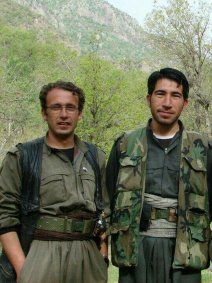
Polat Can in his PKK days (source)
Can’s lecture on “eliminating terrorism,” however, is audacious. Can was a member of the PKK, and his being one of the founders of the YPG is not a testament to his moving on but to the PYD’s nature. The official U.S. position is that “the YPG is not connected to the PKK,” but this is unsustainable upon even a cursory look at the facts.
The PYD was set up in 2003 by the PKK as its Syrian branch under the control of its transnational political structure, the Kurdistan Communities Union (KCK). The PYD claims that it only draws inspiration from the PKK’s founder, Abdullah Ocalan (“Apo”), and his ideology, “Democratic Confederalism,” but has no material link to the PKK. In reality, the PKK is not only in political but physical control of the PYD/YPG.
Several thousand PKK fighters moved from the Qandil Mountains to Syria in 2011-12, likely initially under a deal with their old ally in Damascus to sow dissent in the anti-Assad ranks, and then to fortify the PYD-held areas once the regime drew back from them. There are certainly many more PKK operatives in YPG ranks now, many of them Syrians from the time the PKK was an instrument of the Assad regime against Turkey and was allowed to widely recruit in the country, though a recent visitor to northern Syria said the presence of Turkish PKK troops was visible in many areas.
The PYD-regime relationship is complicated but overall very clearly more conciliatory than confrontational, even with recent events in Hasaka City. The regime has retained a considerable presence in PYD-held areas that has only recently been challenged, but the reliance of the PYD on regime services remains. The regime has also not engaged in wholesale aerial bombardment of PYD-held areas, as it has rebel-held areas, an indication that just as the regime saw benefit in IS holding territory, so it is with the PYD.
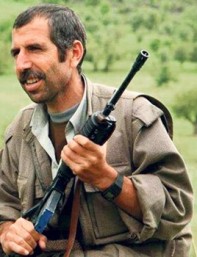
Fehman Hussein (Bahoz Erdal)
It was alleged in 2012 that Fehman Hussein (Bahoz Erdal), one of the most senior PKK military officials, was leading the PYD’s militias. Hussein was reported to have been killed in Syria in July. Hussein is probably alive and also probably in Syria. Hussein is additionally accused of leading the Kurdistan Freedom Hawks (TAK), which gives the PKK deniability for the more gruesome terrorist attacks in Turkey. Subsequent reporting suggests that, after the PKK’s 2013 leadership reshuffle, senior PKK official Nurettin Halef al-Muhammed (Nurettin Sofi) took charge of the YPG, with Ferhat Abdi Sahin (Sahin Cilo) as his deputy.
In short, if you believe the PYD and the PKK are unconnected, there could very well be beachfront property in Chad in your future.
The PYD’s nature will sometimes be conceded, but its apparent local focus will be highlighted as a mitigating factor. There are two problems with this. One, as Sam Heller has pointed out, is the troubling parallel it raises with Jabhat al-Nusra, al-Qaeda in Syria, which has now rebranded itself as Jabhat Fatah al-Sham (JFS) to further its local integration—and al-Qaeda’s agenda. Second, it ignores the unguarded statements of PYD members, who are clear that the PKK’s transnationalism is at best paused: they are starting with Syria but Turkey specifically is next and then all Kurdish-majority areas. In just the last few hours, a pro-PYD journalist, Hussein Omer, has reported that the PKK will begin a wave of attacks inside Turkey if she continues confronting the PYD in Syria, and a PKK leader, Duran Kalkan (Selahattin Abbas), has publicly threatened the same.
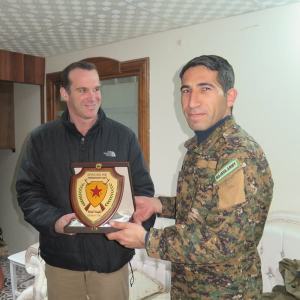
Brett McGurk meeting Polat Ca, 30 January 2016
Given this, Turkey’s extreme anxiety about a PYD-run statelet on its border looks less irrational—it is not some racist, anti-Kurdish vendetta, but a security concern that any Turkish government, of any ideological character, would share. Same with the annoyance Ankara felt when Brett McGurk, the U.S. representative to the anti-IS coalition, met publicly with Polat Can in northern Syria.
Maybe the PKK should be taken off the terrorism list. Maybe the PYD’s authoritarian governance, which inter alia regards information put out without the approval of the PYD Media Center as “an attempt to deliver information to terrorists,” and its dubious methods of warfare, are just prices we have to pay to defeat IS. Maybe providing political extremists with weapons to fight jihadists that they could use against NATO partners was not the wisest idea, and when those weapons are turned on other assets like the vetted Syrian rebels it should come with some kind of penalty.
There are trade-offs on all points, and supporting the PYD to keep IS out of Kurdish-majority areas is clearly necessary, not least because the PYD have ensured there is no other option. But honesty about the PYD is the starting point analytically, even if political front-groups and legal obfuscation is required operationally.
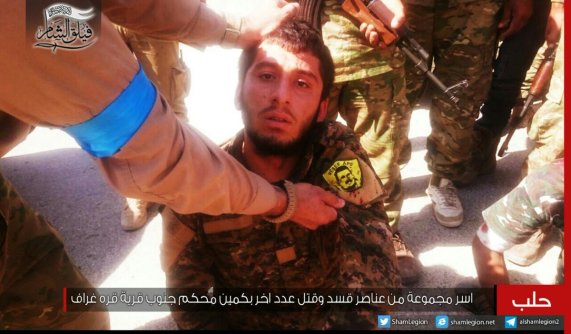
PYD/YPG fighter captured by Faylaq al-Sham, 28 AUG 2016. Patch is a picture of PKK’s Abdullah Ocalan (“Apo”), reads: “Apo the Leader”.
It should be recognized that while Turkey has taken a dark turn, internally and with some deeply problematic allies and proxies in Syria, this current round of chaos was something Ankara tried hard to avoid. Since June 2015, Turkey tried diplomatically to have the U.S. restrain the PYD’s maximalism, and the PYD serially violated these agreements with no U.S. sanction, even when the PYD employed Russian airstrikes to attack U.S.-supported rebels. Manbij was the final straw and after the White House slow-rolled again earlier this month—either to prevent the operation altogether or to keep the U.S. out of it—Turkey acted alone to enforce her red lines.
The flare-up was inevitable once it reached this point, but the U.S. could have arrived at a sensible PYD-Turkey modus vivendi—and prevented this intervention, whose complications it now decries—had it heeded the concerns of its ally earlier. Still, the U.S. has ratified Turkey’s fait accompli and the situation appears to be stabilizing—albeit with the PYD now making moves from Efrin.
In the meanwhile, the irony can be savoured that the U.S. ignored her own laws against terrorism to invite a PKK operative into a counter-terrorism coalition, and he then accused her allies of being terrorists.
Reblogged this on YALLA SOURIYA.
LikeLike
I like your writings, but now you are lying. “While Turkey has not supported IS,” – Turkey provided ISIS with air support – remember, how Davutoglu bragged about bombing YPG boats trying to cross the Euphrates (and attack ISIS)? Remember, how ISIS attacked Kobane from the silos belonging to Turkish ministry of agriculture?
Also, you may call Polat Can “terrorist” for being a member of PKK, but what would be the meaning of the term “terrorist”, then? PKK has never done even 1% of crimes commited by Turkish regimes and TSK. Do we call TSK an terrorist organization, then? If we call PKK terrorists (and hell, I’m not their supporter), but not TSK and it’s generals, then there’s no shame in being “terrorist”.
LikeLike
“Lying” I think is an unfair word there. It’s a matter of interpretation: clearly an official blind eye was turned to the flow of foreign fighters for a period of time and Ankara prioritized the PYD threat over the IS one. That degree of complicity in IS’s rise doesn’t amount to “support” in my view, certainly not to the extent and in the way that, say, the Assad regime assisted IS.
As to TSK etc.: none of that was my point. It was strictly on this question of whether the PYD is or is not a branch of the PKK. Clearly it is. Once that’s established, as you evidently agree, we can have all these further debates.
LikeLike
Nour al din Zenki isn’t a terrorist organization, Ahrar al Sham, Sultan Murad? Are you serious?
LikeLike
Ahrar is a more complicated case, but no, the others are not terrorist organizations.
LikeLike
Pingback: Of Kurds and Compromises in Syria | The Syrian Intifada
Pingback: Revolutionary War 2016 Round Up: The Beginning of the End | الثورة الديمقراطية، الطراز السوري
Pingback: Testimony of an American Fighter with the Syrian Kurds | The Syrian Intifada
Pingback: PKK and Propaganda | The Syrian Intifada
Pingback: Turkey Continues to Protest the Coalition’s Syrian Kurdish Allies | The Syrian Intifada
Pingback: Coalition Allies Play Into Islamic State’s Hands | The Syrian Intifada
Pingback: A “Syrian Democratic Forces” Defector Speaks About the Role of the PKK and America in Syria | The Syrian Intifada
Pingback: Russia Moves in For the Kill in Syria | The Syrian Intifada
Pingback: The Coalition’s Flawed Endgame Strategy for the Islamic State | The Syrian Intifada
Pingback: Liberating Raqqa from the Islamic State | The Syrian Intifada
Pingback: Islamic State Likely To Increase Terrorism Against Turkey | The Syrian Intifada